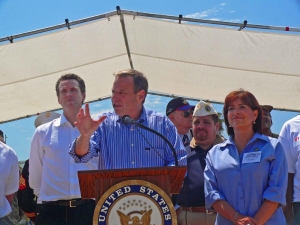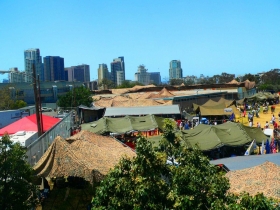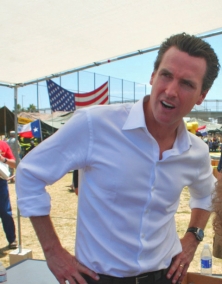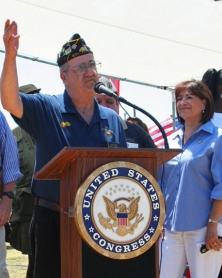 HALF OF ALL HOMELESS IN SAN DIEGO ARE VETS
HALF OF ALL HOMELESS IN SAN DIEGO ARE VETS
By Miriam Raftery
Photos by Joel Ryerson and Leon Thompson
July 18, 2009 (San Diego)—“No mayor in America has done more for homeless veterans than Gavin Newsom,” Congressman Bob Filner (D-Chula Vista), chairman of the House Veterans Affairs Committee, told veterans and media during a press conference yesterday at Stand Down, a three-day event at San Diego High School to help homeless veterans.
Filner announced that he has met with the new head of the Veterans Administration and that both agree there should be “zero tolerance for homeless veterans on the streets of America.”
The problem is particularly acute in San Diego, where 50% of all homeless people are veterans. A quarter of those are vets who served in Iraq (including Desert Storm and Operation Iraqi Freedom), while 70% are Viet Nam veterans. Two-thirds are diagnosed with both treatable mental illness and substance abuse problems.
One of the most successful programs in the nation is Veterans Village of San Diego, which claims an 80% success rate including treatment, one year employment, and no reversions--double the rate of any other program nationwide. Stand Down, hosted by V.V.S.D., brings together a wide range of services in one location to help veterans with shelter, food, clothing, medical and dental care, showers, legal assistance, mental health and substance abuse counseling, spirtiual services, job placement and help with VA benefits.
 Filner laid out a three-point plan to assist homeless vets. First, he aims to double the $34 a day payment which the federal government provides to veterans in shelters. Second, the Veterans Affairs department should do more aggressive outreach to the veterans who are homeless. “We do it in San Diego. We should do it everywhere,” Filner said. “They’ve earned those benefits.” Third, he announced an upcoming survey of V.A. land to locate places for housing on federal lands near V.A. medical facilities.
Filner laid out a three-point plan to assist homeless vets. First, he aims to double the $34 a day payment which the federal government provides to veterans in shelters. Second, the Veterans Affairs department should do more aggressive outreach to the veterans who are homeless. “We do it in San Diego. We should do it everywhere,” Filner said. “They’ve earned those benefits.” Third, he announced an upcoming survey of V.A. land to locate places for housing on federal lands near V.A. medical facilities.

Newsom (photo, left), a Democratic candidate for Governor, said he is passionate about ending homelessness among veterans, adding, “It’s what brought me into politics.” Newsom, who co-chairs the U.S. Conference of Mayors task force on hunger and homeless, added, “Mark my words, we know how to solve homeless. Housing ends homelessness. Shelters solve where to sleep.” Veterans also need help with substance abuse, traumatic brain injuries and other barriers to help them adapt to civilian life. In addition, Newsom urged, veterans “need the support of Americans.”
Project Homeless Connect, a San Francisco-based organization, now has 26,000 volunteers who are not waiting for government to solve problems, observed the Mayor. He also praised Filner’s efforts. “Congressman, what you have done in the last three months is truly more than the last Veterans Affairs Committee Chair has done in the past eight years,” said Newsom.
Mary Salas (D-San Diego), has served as chair of the California Assembly Veterans Affairs committee for the past three years. “We’ve looked up and down the state for models that work, models that we can replicate,” she said, adding that San Diego and San Francisco are leaders in helping homeless veterans. “It’s all about cooperation on the state, federal and local levels.”
Salas announced enabling legislation for affordable rental housing for veterans as well as training to help them transition out of the military, including addressing mental health needs. “We know that on any given night, across America 25% of the homeless are veterans. This is unacceptable,” Salas declared.
Stand Down began in San Diego back in 1988, the brainchild of two homeless veterans. Today, some 300 stand-downs are held across the nation each year to help the nation’s estimated 200,000 homeless veterans through community-based intervention programs.
Republican Brian Maienschein, a former San Diego Councilman, now heads a commission to end chronic homelessness for the United Way. “If every politican cared about homeless veterans, we would never have a homeless veterans problem in America,” he said. “Permanent housing is the way to solve the problem.” In San Diego County, the goal should be to create 1,600 permanent housing units for veterans, he said.
Sergeant Major Bill Paxton urged volunteers to “Go to the hospital. Talk to some of those wounded veterans…Show them your appreciation; all they ask for is a thank you.”

Sunny Farrand (photo, right, with Salas), founder of Heroes to Hometown in San Diego, spoke movingly of his own experiences on the streets downtown. “In 1995, I came here and was a homeless vet,” he said. “I hung out with two others. I walked from here to El Cajon for help from an interfaith council.” Yet Farrand said he was more fortunate than most, because he had a job. “I was a cook,” he recalled, adding that he also had to overcome alcoholism.
Since then, he’s succeeded in aiding other homeless vets—including some in desperate need. “I helped a woman who was going to have her leg amputated. Now she runs two and a half miles a day,” he said.
One problem fueling homelessness is that 52% of Reservists are serving in Iraq and Afghanistan. Before being deployed, many had businesses and savings. “Now they come home and they have no business, no money in the bank,” Farrand observed, adding that many have asked him why he doesn’t quit working to help others now that he’s successful. “I will quit when this war is over and there’s not another homeless veteran on the street,” he concluded.
Farrand said he’s located a 75-acre site where he hopes to have job training, counseling and housing. Another project, the Garden Fund, seeks to match up an individual with land for housing with a source that can provide funds.
Among the homeless veterans seeking help at this year’s Stand Down was Jackie Casiano, a veteran of conflicts in Granada and Desert Storm who also served 13 years at the Naval Medical Center in San Diego. “I married a submarine sailor and followed him around the world,” said Casiano, an Army veteran who is now divorced, homeless and unemployed. But she expressed confidently, “I’m here and I will get my job training, that’s one of the benefits of being a veteran.”
Roger Reed is owner of Blue Pyramid Design Studio, a disabled veteran-owned business. “There is, starting Monday, a veterans’ small business conference in Las Vegas,” he told East County Magazine. “The Department of Defense, Army, Pentagon, all have a goal to provide 3% of all contracting jobs to vets.” Reed said he plans to attend the conference and report back to Congressman Filner and Assemblywoman Salas on the state of small business for veterans.
He wants to work with the Southwest Business Resource Center in Fallbrook to make more information available to veterans when they leave the service and reenter civilian life. He asked, “Why wait until vets are under the bridge to pull them back out?”
For more information on homeless veterans, and how you can help, visit the National Coalition for Homeless Veterans.










Recent comments